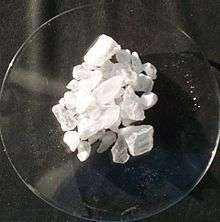Definify.com
Webster 1913 Edition
Alum
Al′um
,Noun.
[OE.
alum
, alom
, OF. alum
, F. alun
, fr. L. alumen
alum.] (Chem.)
A double sulphate formed of aluminium and some other element (esp. an alkali metal) or of aluminium. It has twenty-four molecules of water of crystallization.
☞ Common alum is the double sulphate of aluminium and potassium. It is white, transparent, very astringent, and crystallizes easily in octahedrons. The term is extended so as to include other double sulphates similar to alum in formula.
Al′um
,Verb.
T.
To steep in, or otherwise impregnate with, a solution of alum; to treat with alum.
Ure.
Webster 1828 Edition
Alum
AL'UM
,Noun.
A triple sulphate of alumina and potassa. This substance is white, transparent and very astringent; but seldom found pure or crystallized. This salt is usually prepared by roasting and lixiviating certain clays containing pyrites, and to the lye adding a certain quantity of potassa; the salt is then obtained by crystallization. Alum is of great use in medicine and the arts. In medicine, it is used as an astringent; internally, in hemoptoe, diarrhea, and dysentery; externally, as a styptic applied to bleeding vessels, and as an escharotic. In the arts, it is used in dyeing to fix colors; in making candles, for hardening the tallow; in tanning, for restoring the cohesion of skins.
Definition 2026
alum
alum
See also: alúm
English

Alum (double sulphate of potassium and aluminum)
Alternative forms
Pronunciation
Noun
alum (plural alums)
- An astringent salt, usually occurring in the form of pale crystals, much used in the dyeing and tanning trade and in certain medicines, and now understood to be a double sulphate of potassium and aluminium (K2SO4.Al2(SO4)3.24H2O). [from 14th c.]
- 1991, Felix Gilbert, The Pope, His Banker, and Venice, page 80,
- Venice also needed alum for trade, since it was the point of departure for overland transportation of alum to southern Germany and its cloth-manufacturing Free Cities.
- 2011, Thomas Penn, Winter King, Penguin 2012, p. 201:
- A natural astringent and antiseptic, potassium alum was coveted for its medicinal and cosmetic properties.
- 1991, Felix Gilbert, The Pope, His Banker, and Venice, page 80,
- (chemistry) Any similar double sulphate in which either or both of the potassium and aluminium is wholly or partly replaced by other univalent or tervalent cations. [from 17th c.]
- 1807, William Nicholson (editor), A Journal of Natural Philosophy, Chemistry, and the Arts, Volume XVIII, page 286,
- With weld and cochineal, which are colouring matters the most sensible to the action of sulphate of iron, the purified alums gave us colours more brilliant, fresh, and in a slight degree lighter; while those with our common alums were all duller, and evidently of a deeper hue.
- 2000 June, Competition Science Vision, page 486,
- For similar reasons, aluminium sulphate and alums are used in dyeing cloth. […] Normally alums are soluble in water and insoluble in alcohols.
- 2005, Amit Arora, Text Book Of Inorganic Chemistry, page 386,
- In structure, the alums consist of simple ions, being not complexes, but double salts. Potash alum or potassium alum is the common alum, with the formula KAl(SO4)2.12H2O) which, for convenience, may be written K2SO4.Al2(SO4)3.24H2O
- 1807, William Nicholson (editor), A Journal of Natural Philosophy, Chemistry, and the Arts, Volume XVIII, page 286,
Synonyms
- (double sulphate of potassium and aluminum): potash alum
Derived terms
term derived from alum
|
|
|
Related terms
- aluminiferous, aluniferous
- aluminiform
- aluminilite
- aluminise, aluminize
- aluminite
- aluminous
- alunite
- alunogen
Translations
chemistry: double sulfate
Verb
alum (third-person singular simple present alums, present participle aluming, simple past and past participle alumed)
- (transitive) To steep in, or otherwise impregnate with, a solution of alum; to treat with alum.
- (Can we find and add a quotation of Ure to this entry?)
Derived terms
Etymology 2
From alumnus and alumna, by removal of the non-native, gender-specific endings.
Pronunciation
- IPA(key): /əˈlʌm/
Noun
alum (plural alums)
- (US) A graduate of a university or other institution.
- 1961 Spring, Anchora of Delta Gamma, Volume LXXVII, No. 3, page 59,
- Evanston-North Shore alums are happy to open their homes to Sigma actives for special social events.
- 2006, Ted Hart, James M. Greenfield, Pamela M. Gignac, Christopher Carnie, Major Donors: Finding Big Gifts in Your Database and Online, page 47,
- You'll remember that we're starting with a list of slightly over 7,000 names that are alums (most of them over 50) that we'd like to whittle down to a manageable list of prospects.
- 2009, Timothy C. Jacobson, Charity & Merit: Trinity School at 300, page 190,
- All schools that last have alums, and, ancient as it was by American standards, Trinity by mid-century had thousands.
- 1961 Spring, Anchora of Delta Gamma, Volume LXXVII, No. 3, page 59,
See also
- apjohnite
- bosjemanite
- halotrichite
- kalinite
- websterite
Anagrams
Latin
Etymology
From Proto-Indo-European *ālu (“esculent root”), uncertainly reconstructed. Related only to Sanskrit आलु (ālu, “esculent root”), whence Hindi आलु (ālu, “potato, yam”), and the culinary borrowing, English aloo (“potato”) and Latin allium (“garlic”).
Pronunciation
- (Classical) IPA(key): /ˈa.lum/, [ˈa.ɫũ]
Noun
alum n (genitive alī); second declension
- A plant, the comfrey
Inflection
Second declension.
| Case | Singular | Plural |
|---|---|---|
| nominative | alum | ala |
| genitive | alī | alōrum |
| dative | alō | alīs |
| accusative | alum | ala |
| ablative | alō | alīs |
| vocative | alum | ala |
References
- Félix Gaffiot (1934), “alum”, in Dictionnaire Illustré Latin-Français, Paris: Hachette.
- alum in Charlton T. Lewis and Charles Short (1879) A Latin Dictionary, Oxford: Clarendon Press